Audience Insights: Meet the Persuadables in the UK

We talk a lot about 'The Persuadables', the 69% of people in the UK who are neither climate activists or climate deniers. We call them this because they are still 'persuadable' by both pro-climate and anti-climate groups. This makes them an essential audience to engage with - because they've not yet made up their mind about climate action. Increasing public support for climate-positive policies that limit climate change beyond 1.5 degrees Celsius is important for ensuring our politicians listen too.
In this guide, we will reveal our flagship research with key Persuadable groups. During a mixed-method and immersive qualitative program of research with cultural insight agency Bricolage, we spoke to:
- Urban 'somewheres' in Newcastle
- British Black & South Asian communities in Birmingham
- Rural Dwellers in Yorkshire
Our insights paint a picture of how most of the UK really feel about climate change, and how we can better engage them in our communications.
Inside:
Who are the Persuadables? Methodology and getting to know the people at the core of this research.
What makes them tick? Exploring their cultural context and media habits.
What are their views on climate change? Hatred for climate activists, confusion, and misinformation overload.
Last updated 06/06/2023
Who are the Persuadables?
Methodology and getting to know the people at the core of this research.
The climate movement has done a great job of raising the alarm, making climate action a key part of the political agenda and engaging new people in the matter. However the conversation has largely focused on certain groups over others, the young, white, better off and left – who are already supportive of climate action.
This means that even though most people are worried about climate change and its effects, some are being left out of the climate conversation. These groups are less likely to see positive stories and feel supportive of climate action, especially if they don't immediately see the benefit to them and their families. Many of these people are older, male, working class or from multi-ethnic communities. Being left out leaves them open to misinformation, because many denier and delayer organisations actively target them to try and persuade them the other way.
We call these act risk groups The Persuadables, and they make up 69% of the population who are undecided on climate issues.
The Persuadables we engaged with:

Immersing ourselves in their world
We used a mixed-method qualitative approach to our research, in partnership with cultural insights agency, Bricolage, which included:
Looking into their world
- 6 expert interviews with acedemics and leaders from Persuadable's world
- Desk research on Persuadables using Canvas8, Pulsar and acedemic texts
- Semiotics and culutral analysis across each location, visiting the places core to their communities

Looking out at the world with Persuadables
- 18 In-depth interviews with Persuadables at their homes or online, pre-tasked to tell us about their media habits
- 10-12 creative stimulus review to understand which climate messaging resonates
- Online activity to work out which media spokespeople they trust and listen to when it comes to climate

What makes them tick?
Exploring their cultural context and media habits.
Across these diverse audiences, their cultural context is shaped by common elements
Across all at risk groups it was clear that Persuadables feel unrepresented by politics and the big decisions in society. Inequalities in class, race and region are currently excluding them, leaving them more vulnerable to societies big challenges such as the cost of living crisis and Brexit. This is causing frustration and distrust towards institutions.

There are varieties when it comes to the aspects of culture that shape their worldview:

Their relationship to news and media has changed
Some are bingeing (especially seen in Urban Somewheres)
Some Persuadables find themselves glued to the news throughout the day, whether it's on their TV or phone, it feels unescapable and constant. Climate-related news can easily get lost among the masses.
Some are drowning (especially seen in Rural Dwellers)
Other Persuadables find themselves in information overload, unsure of how to navigate the news they do see. Sceptical, they are unsure of which media sources or personalities to trust. Climate can feel like a puzzle in this environment.
Others are turning away (especially seen in Multi-Ethnic Communities)
For many, in an adversarial media environment, it's easier to disengage completely. These Persuadables avoid the endless news and don't tend to use social media as much as most. Climate content can get completely lost here.
What are their views on climate change?
Bigger issues to think about, untrusted messengers, and misinformation overload.
Across the board climate has taken a backseat, with 'bigger issues' keeping them up at night
When asked to speak about the top 5 biggest challenges they currently faced, many couldn't think beyond the cost of living crisis, which is effecting their ability to heat their homes, feed their family, and feel secure in their jobs. Other than this, there were a host of other issues that concerned them, many of them only remembering about climate changed when prompted in the research.

There are nuances in their attitudes
Whilst a feeling of apathy and distrust towards the climate movement united them all, each group had differing perspectives on climate. Urban Somewheres felt priced out, British Black & South Asian communities felt deeply sceptical, and Rural Dwellers felt lost and left behind.

Persuadables don't connect with current climate spokespeople
Climate activists, reporters, researchers and organisations are seen as:
- Snobs with a placard, who are extreme and fanatic in their views.
- Unapproachable 'so-called' experts who speak in jargon and riddles.
- Liberal elites and metropolitan types who don't understand the issues facing the rest of the UK.
- Young, priveleged and out of touch with real life issues.
- White people who don't have ethnic minorities interets at heart when talking about 'better future' or 'security'.
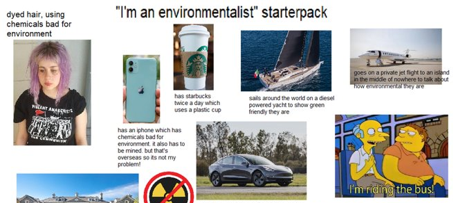
Friends and experts are trusted if their common sense moderates
When we asked Persuadables to pick out who was most and least trustworthy from a list of alternate climate spokespeople, farmers, union representatives and, pro-climate Conservative MPs came up top. Our winning ideal influencer however, was Countryfile Presenter Adam Henson, who came out top across all segments of Persuadables.

Persuadables media environment is shaping their views on climate
Crowded and filled with viral misinformation and delay narratives, climate related content is fighting for attention, and currently failing to keep up. This is creating confusion, doubt and inaction.
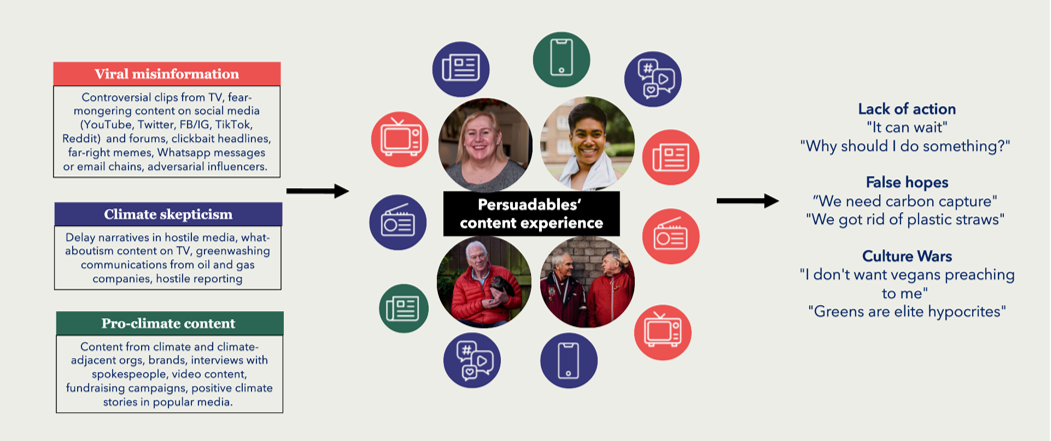
Pro-climate advertising gives us a chance to create a shield from some of the anti-climate content Persuadables are currently consuming. It won't take away the misinformation or the hostile reporting from the mix, but by using techniques to boost effectiveness and relatability, we are able to create a shield which can lessen the impact of the negative messages they do see.
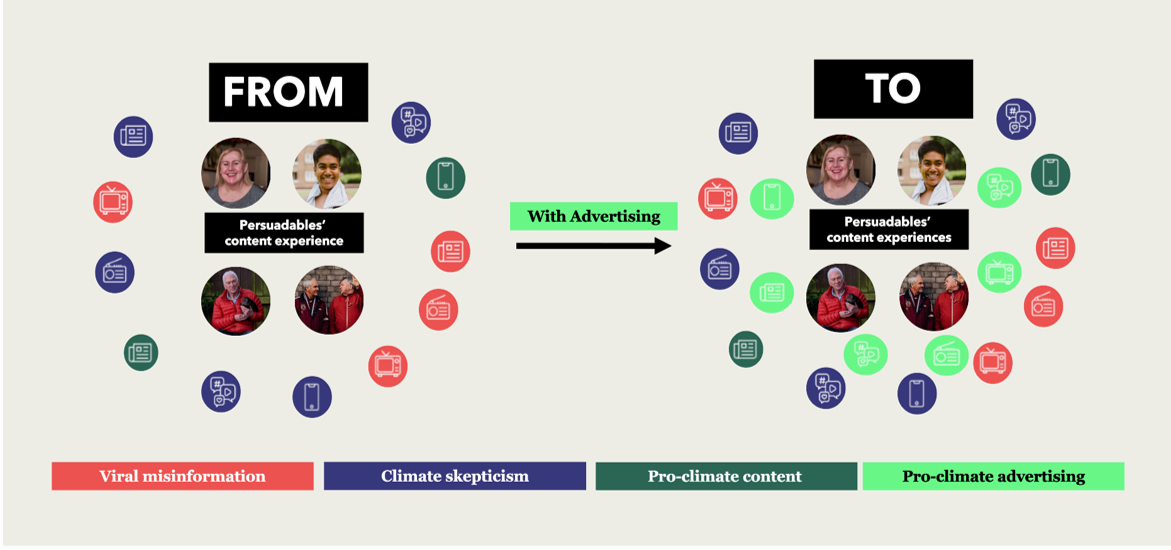
Catch our 10 recommendations for communications powered by this research here
Advertising Guide: How we created impact with six innovative climate campaigns. A resource bank to dive into learnings from our advertising campaigns so far.
Advertising Guide: Reframing. Tools and case studies that will help you craft compelling stories and supercharge communication effectiveness.
Advertising Guide: Fact, Myth, Fallacy. A useful model on how to identify and combat misinformation.

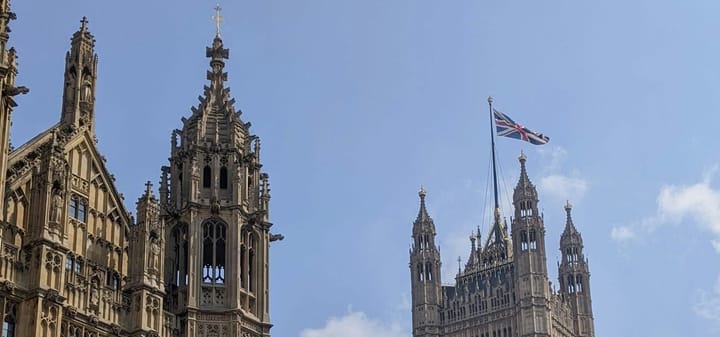

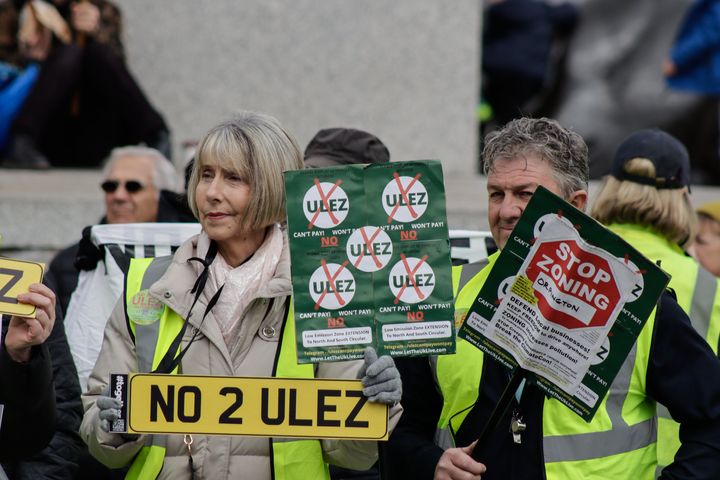
Comments ()